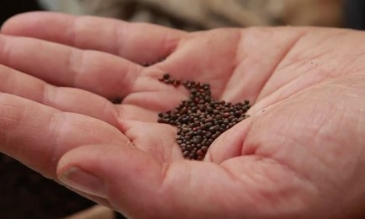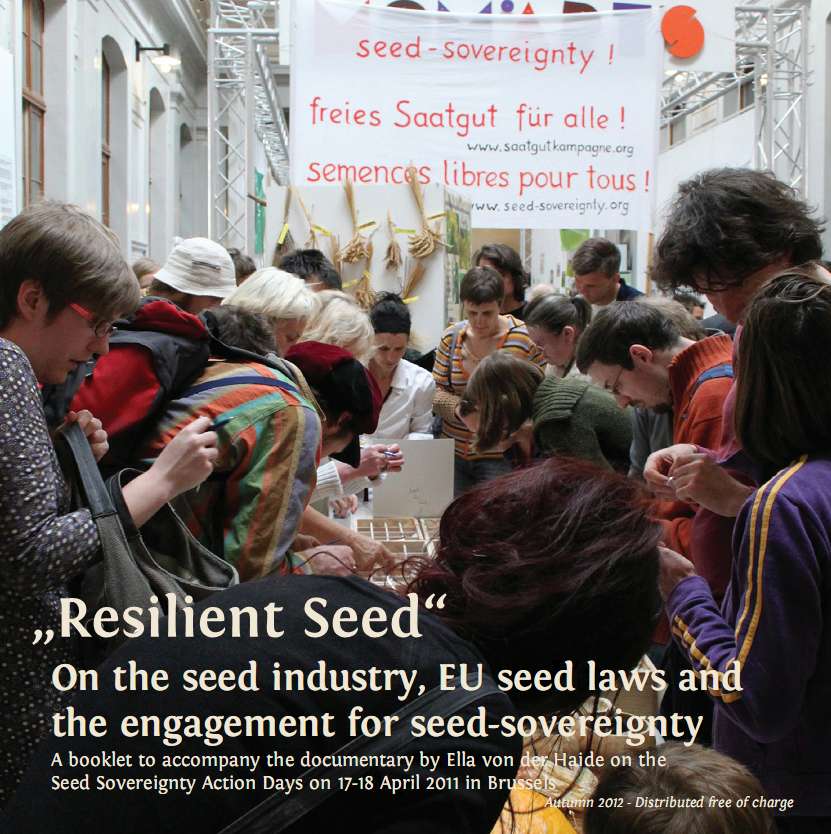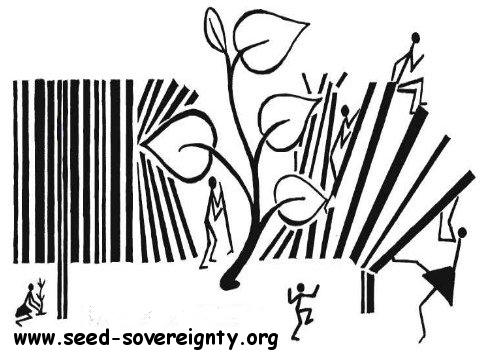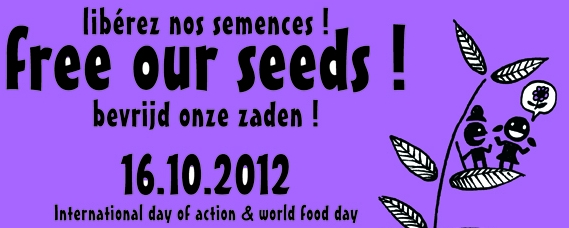
Kampaň za suverenitu osiv vůči
Campaign for Seed-Sovereignty: Seeds must remain part of the Commons!
![]() Členové
europarlamentu kritizují nový evropský zákon
o osivech
Členové
europarlamentu kritizují nový evropský zákon
o osivech
Kritika
kampaně za suverenitu osiv vůči návrhu nové
regulace osiv byla potvrzena příspěvky členů
evropského parlamentu, kteří ji přednesli
na mítingu komise pro rozvoj zemědělství a
venkova. Během
mítingu konaného v pondělí 30.9.2013*
si
vzali slovo Martin HÄUSLING (Greens/EFA; Německo),
Ulrike RODUST (S&D; Německo), Britta REIMERS (ALDE;
Německo) and Karin KADENBACH (S&D; Rakousko) a
kritizovali sílící soustřeďování
(centralizaci) v osivovém byznysu a vysoký počet
aktů v přenesené pravomoci. Požadovali deregulaci
malých výrobců a transparenci metod pěstování
odrůd. (…)
(…)
Tato
změna v politice osiv by se zaměřila na podporu a
stimulaci skutečné rozmanitosti v odrůdách
semen. Důležité jsou odrůdy, které jsou
uzpůsobené regionálním podmínkám
půdy a klimatu, ty, jež jsou uzpůsobené domácímu
a řemeslnému zpracování, stejně
jako ty, jež jsou zdrojem rozmanitosti chutí a mají
široký genetický základ. Skrz
pokračování současných principů
osivové legislativy, rozšíření
rozsahu osivového zákona a uchování
DUS odrůd jako standardu by došlo k urychlení
eroze zemědělské biodiverzity a základ
výživy pro následující věk by se
dostal do ohrožení.
Podepište otevřený
dopis „Rozmanitost
osiv v ohrození“
Brighton
Corn Exchange
February 3, 10 a.m. - 4 p.m.
Web
– Twitter
Recaim
the Seeds Meeting (NL)
March 2-3
by
A Seed NL et. al.
Den
Bosch, Netherlands
Bonn
(D)
9. März 2013, 11-17 Uhr
Saatgut ist Kulturgut: Festival des Vereins zur Erhaltung der Nutzpflanzenvielfalt
Thurauen
(CH)
23./24. März 2013
Internationale Saatgut-Tauschbörse von Longo Mai und Pro Specie Rara
Peliti
International Seed Festival (HE)
May
11 - 13
![]() „ESA
is afraid of free competition with farmers' varieties”
„ESA
is afraid of free competition with farmers' varieties”
JOINT STATEMENT ON THE PROPOSAL ON LEGISLATION ABOUT PLANT REPRODUCTIVE MATERIAL
signed byAegilops (GR), Agrolink (BG), Arche Noah (A), A Seed Europe, Bifurcated Carrots (NL), Bio Austria, Campaign for Seed Sovereignty, Danish Seed Savers, Dachverband Kulturpflanzen- und Nutztiervielfalt (D), Eco Ruralis (ROM), Forum Civique Européen (F-D-A-CH), Föreningen Sesam (S), GAIA (P), Garden Organic (UK), Global 2000 (A), ZMAG (HR), Irish Seed Savers, Latvijas Zemes draugi (Friends of the Earth Latvia), MPI (P), ÖBV – Via Campesina Austria, Peliti (GR), Praktisk Økologi (DK), Quercus (P), Varuhi semen (SL)
On the occasion of the conference the EU Commission held on 13th of June with the EU Parliament and EU Council to explain the package “smarter rules for safer food“ on seed marketing, plant pests, animal health and related official controls.
Whilst in the preamble, the proposal for the plant reproductive material law looks as if every effort is being made to preserve and promote agricultural biodiversity and on-farm conservation, the reality is that the opposite is happening. New rules and restrictions have been created which hamper the freedom of farmers and seed saving organisations. In addition, the “niche” (art. 36) is not going to work in a practical sense, because of the restrictions assigned to “niche” sector and the perspective of them being further tightened by means of “Delegated Acts” by the EU Commission at any stage.

Rozmanitost
osiv v ohrožení -
Proti
nařízení EU o osivech ve prospěch
osivářského průmyslu
Vážení
členové Komise,
Vážení členové
Parlamentu,
Vážení členové Rady!
V
současné době je v Bruselu navrženo nové
nařízení o osivech. Pokud je přijme
Ředitelství pro zdraví a ochranu spotřebitele,
mnohé ze starých a vzácných odrůd
ovoce, zeleniny a obilovin zmizí z trhu. Pokud bude těmto
rozmanitým odrůdám a odrůdám
vhodným pro ekologické zemědělství
byrokraticky bráněno v šíření,
dojde k dalšímu posílení
korporativního zemědělství.
Text nového
znění nařízení EU o osivech, který
je v současné době k dispozici, umožňuje
soustředit trh s osivy do rukou malého počtu
osivářských průmyslových korporací.
To není akceptovatelné. Nové nařízení
EU o osivech musí umožňovat rozmanitost odrůd;
odrůd pro hospodaření v malém a zaměřených
pro ekologicky adaptované šlechtění.
Rozmanité odrůdy musí být dostupné
nejen v genových bankách, ale rovněž na
otevřeném trhu bez jakýchkoli byrokratických
restrikcí. Proto požadujeme: žádná povinná
registrace!
Kromě toho, současná kritéria
pro registraci musí být – kvůli jejich
rozmanitosti - změkčena pro odrůdy vhodné
pro ekologické zemědělství, aby naše
zemědělství bylo schopno adaptovat se na
klimatickou změnu, nové škůdce a choroby
stejně tak i kvůli přátelštějšímu
chování vůči životnímu prostředí.
Současný zákon EU o osivech, ani v současné
době dostupný předložený návrh,
nenaplňují legální výměnu.
Ohrožují rozmanitost osiv a tak společné
bohatství lidstva. Rovněž tak ohrožují
udržitelné potravinové systémy jen proto, aby
sloužily agrochemickému průmyslu.
Žádáme
Vás Komise EU, Parlamente EU a Rado EU, abyste odmítly
jakýkoli návrh, který nenaplňuje výše
uvedená kritéria.
Konec s likvidací
rozmanitosti zemědělských a zahradnických
osiv v Evropě!
Více informací na:
-
Campaign for Seed-Sovereignty www.saatgutkampagne.org /
www.seed-sovereignty.org/CZ/index.html
- German umbrella organisation for crop and livestock
diversity („Dachverband Kulturpflanzen- und Nutztiervielfalt
e.V.“):www.kulturpflanzen-nutztiervielfalt.org/node/29
- Patrick Wiebe’s Blog: http://www.bifurcatedcarrots.eu/
Argumentace:
Současné nařízení
EU o osivech vychází z doby, kdy ochrana životního
prostředí a druhové rozmanitosti byly
podceňovány. Existovaly četné
šlechtitelské podniky, které přicházely
na trh s velmi rozmanitými odrůdami. Většina
z nich mohla být po sklizni opět vysévána
– a to je způsob, který doprovází
zemědělství po tisíce let.
Rok 1980
přinesl dva nové termíny pro něco, co až
dosud bylo běžnou praxí: za prvé „práva
zemědělců“ a za druhé „volně
opylovatelné odrůdy“ (semínka produkující
stejnou odrůdu, aniž se křížila s podobnými
odrůdami). To je ten důvod, proč se obchod s osivy
dramaticky změnil. Dnes největší
společnosti ovládají tři čtvrtiny
trhu s osivy, a více než polovina globálního
trhu pochází z chemického průmyslu.
Na
většinu odrůd se vztahují právní
a technická omezení, která znemožňují
záchranu přeséváním osiv
samotnými pěstiteli. Byl zaveden úřední
postup pro obchodování s odrůdami a kritéria
pro něj jsou přizpůsobena průmyslovým
odrůdám. Jako obhajoba tohoto byly využity pojmy
produktivita a růst světové populace. Nestabilitu
tohoto přístupu dokládá vyčerpávající
zpráva Mezinárodního panelu pro hodnocení
zemědělských technologií a vědy pro
rozvoj (IAASTD).
Rozmanitost plodin z velké části
zmizela z trhu. Týká se to rozmanitosti
neregistrovaných odrůd – obchodují s nimi
tisíce neohrožených občanů Evropy bez
požadované registrace. Dnes se musíme spoléhat
na rozsáhlé odborné znalosti těchto lidí
a měli bychom do této činnosti zapojit co nejvíce
dalších lidí, nejen jako formu hobby, ale
jako nezbytnost k obživě.
Druhým důležitým
aspektem je, že nebyly dochovány téměř
žádné odrůdy – konkrétně pro
ekologické zemědělství – kvůli
jejich rozmanitosti. Avšak ekologické zemědělství
potřebuje silné, odolné rostliny nezávislé
na chemikáliích. A to je možné pouze v rámci
širokého spektra přírodních
rezerv. Není přijatelné tyto odrůdy
registrovat podle současných kritérií
pro registraci odrůd.
Sign
up the petition!
Hello
everyone who cares about our seeds and our freedom to use,
exchange and sell them!
Take
action in the legislative process of EU-Seed regulation!
There
is urgent action needed to avoid damage by the upcoming new EU
regulation of seed marketing. The new regulation will de facto ban
old and rare varieties and farmers varieties and threaten the
exchange and selling of seeds of diversity.
DG SANCO (the
General Direction of the EU for Sanitary and Consumer affairs) has
been working on a proposal for a new regulation since years. On
Monday, the 6th of May they will present their proposal to the
conference of commissioners. They could not get a consensus of the
two other affected DGs, DG AGRI (agricultural affairs) and DG ENVI
(environmental affairs). Both opposed the last draft of the
proposal, and DG SANCO is not looking for a consensus.
The new
regulation has mainly been drafted by Isabelle Clement-Nissou, an
employee of GNIS, the French lobby of the Seed Industry. Madame
Clement-Nissou was sent as a national expert to Brussels by the
French government and is supposed to „support“ DG
SANCO. The drafts for the proposal became worse from the first to
the second draft; and it is expected that the final proposal is
going into the same direction.
Since there is no consensus
between the three DGs, the commissioners have to vote on the
proposal. If a majority of commissioners votes against the
proposal, it should be stopped. If they vote in favour, it will be
given to the EU Parliament and to the Council.
The seed
industry is pushing the legislation, because they’ve spent a
lot of money to influence the seed legislation. Furthermore, they
don't want it to be postponed after the election of a new
parliament in May 2014. They take the risk that the commissioners
vote against it – and we think: the commissioners should do
so! There is only a little chance to get a majority of
commissioners to vote against the current proposal, but we still
should try.
Each country of the EU has one commissioner in
Brussels, so we need 14 votes against the proposal. The
commissioners of DG AGRI and DG ENVI should vote against, so we
need 12 more.
Please write to the commissioner of your country
and convince him/her to vote „NO“ on the proposal of
DG SANCO on 6th of May.
The Austrian seed saving organisation
“Arche Noah” prepared a draft
letter that you could use as template,
if needed. Or write a better one!
You can find the members
of the current commission here.
Try
to make a link from his/her department to the seed issue, and try
to make clear to him/her that the proposal for a new EU seed
legislation will affect the cultural and biodiversity heritage of
your country and the freedom of farmers to use the seeds and the
varieties they want to.
NO
PROHIBITION OF SEEDS OF DIVERSITY!
Please
write to your commissioner in Brussels immediatelz.
He/she has to make a statement on the proposal from 24th of April
on, the sooner, the better. On the 6th of May, we must obtain at
least 14 objections, otherwise this proposal will become the
official proposal
In order to coordinate the action, please
tell us if you are going to approach your commissioner!
The Latest in the Battle to Reform EU Seed Laws (2013-02-24)

![]() ALERT:
Bad new EU-seed law ahead!
ALERT:
Bad new EU-seed law ahead!
The
DG SANCO (Directorate General for Health and Consumers) of the
EU-Commission is working on a revision of the EU Seed Laws,
currently a series of directives interpreted under national law,
to be replaced by a single regulation that will come into force
directly in all the 27 EU member states without local
interpretation. This would suit the needs of seed multinationals
which want uniform laws in all their markets, but would harm the
diverse structures of agriculture and the diverse use and
production of seeds. If you want to act on behalf of
seed-sovereignty, for farmers and seed-savers, you have to become
active in the coming months!
Diversity
under attack!
The
current draft of the proposed regulation, from Nov. 2012,
contains some draconian measures for farm-based production seeds,
and diversity of plant varieties. Farmers as seed producers would
be subject to the same obligations of registration and regulation
as multinational seed company operators. Varieties of
diversity and old varieties would be endangered, and the
free exchange of seeds and other propagation material could
effectively be forbidden. If varieties have to be registered and
to pass extensive testing, this would put up unreasonably high
barriers for farmers, consumers and the diversity in agriculture
and horticulture.
The European Seed Association, lobby
organisation of the seed multinationals, has two main aims. First
to control the niche markets and make them unattractive, and
second to register all producers of farm saved seed in order to
collect royalties from them. They are also trying to combine the
testing and evaluation for plant variety protection (PVP) and the
licensing for marketing, and to privatize the entire process. This
would hit the small companies and farmers, who would face
increasing and unreasonable testing and evaluation costs, for each
single variety of seed they wish to use.
What‘s
next?
The
current draft regulation was written by DG SANCO. Before it
becomes an official proposal of the EU-Commission, DG AGRI
(Directorate General of Agriculture and Rural Development) and the
DG ENVI (Directorate General for the Environment) have to agree to
it‘s contents. At the moment there are several points of
disagreement.
This opens a window we should use to struggle for
more diversity, for open pollinated varieties (versus ”hybrid”
varieties), and for more diverse seeds in the hands of farmers,
gardeners and seed savers.
Our demands for a new EU seed law:
•No regulation of seed exchange by seed savers and farmers!
•No mandatory registration or certification for open pollinated varieties!
“From
seed to seed” -
An educational film on the production of seeds
 The
film is intended for all those interested in seed production -
beginners, amateur gardeners, farmers, vocational colleges,
children, those who wish to contribute to the conservation of
plant diversity, those for whom it is urgent to grow their own
seeds in order to adapt to different climate conditions or for
food security
The
film is intended for all those interested in seed production -
beginners, amateur gardeners, farmers, vocational colleges,
children, those who wish to contribute to the conservation of
plant diversity, those for whom it is urgent to grow their own
seeds in order to adapt to different climate conditions or for
food security
read
more...
 Resilient
Seed
Resilient
Seed
On the seed industry,
EU seed laws and the engagement for seed-sovereignty
„Resilient
Seed“ - the booklet
chap.
1.: Get informed and take action!
chap. 2.: The power of seed
and agrochemical companies
chap. 3.: Seed marketing law
chap.
4.; Seed law in 2012 at a crossroads
chap. 5.: Plant variety
protection (PVP) and UPOV
chap. 6.: Patents on plants
chap.
7.: How to organise a seed swap
Commission of the EU released drafts for new seed law
In
the first weeks of November the Commission of the EU has released
drafts for new
regulations
of the seed sector:
- „Draft
on plant reproductive materials”
-
„Draft
paper on plant health”
-
„Draft
paper on a proposal on official controls”
Call
to Action for Seed Sovereignty on 16 October 2012:
We
need seed sovereignty
to be able to
achieve food sovereignty!
Our demands are:
open access to fertile and diverse seeds free of any form of legal protection or patenting;
the right for farmers and gardeners to obtain seeds from their harvest, to re-sow, distribute and sell them;
a new model of agriculture based on local, small-scale food webs rather than monocultures requiring high inputs;
new agricultural and trade policies promoting production for local needs and not global “free” trade, dominated by transnational corporations;
policies that favour the needs of farmers and consumers, health and the environment instead of profits for big business.
The
European Court of Justice's decision reconfirms the interdiction
of seed trade:
Diversity of Cultivated Varieties
still endangered
The European Court of Justice stated the validity of current EU legislation on seed commerce by its judgement on 12th of July. Thereby it rejected the fundamental critics uttered beforehand by Advocate General Kokott. Accordingly, the existing trade embargo for seeds from non-registered varieties remains untouched. This is a defeat for the agricultural biodiversity and the ones who dedicate themselves to self-determined agriculture and gardening.
Andreas Riekeberg from the campaign for seed-sovereignty says: „It is an annoying judgement far from the reality. The court solely has reconfirmed the current EU legislation without taking into account the detailed critic by Advocate General Kokott, which pointed out the ongoing destruction of biodiversity on the fields and in the gardens driven by the respective directives. This is a slap in the face of those concerned with agricultural diversity. The judgement keeps going on promoting the seed industry and their uniform varieties which only grow with the help of chemical inputs, be it pesticides or fertilizers.“
Jürgen Holzapfel lives on the farm Ulenkrug in Mecklenburg-Vorpommern, Germany. He is a cultivator of old cereal varieties and saves his own seeds. He says: „I would have to tell the authorities about all the varieties of seeds which I save, even if I use them just for myself. To commercialize them, I would need to register them as conservation varieties, pay the fees and bear in mind not to exceed a certain quantity. I would even have to arrange with other farmers not to exceed the maximum threshold for a specific variety in a specific region. The court claims in the official press release to ensure the protection of plant genetic resources by this provision. This is just not true.“
The objectives of the campaign for seed-sovereignty are described by Anne Schweigler: „We will continue to struggle for the common right of all farmers and gardeners to decide for themselves which variety to cultivate. We will keep on organizing seed swaps and enhancing regional and international networks. The production of food and our alimentation have to be self-determined and must not be controlled by the agro-industry.“
The campaign for seed-sovereignty criticizes the policy of conserving the biodiversity stretched into a dwarfish frame by the EU directive. This in turn shall impede the emergence of a market of regional farm-saved seeds, e. g. for vegetables, cereals and seed oil as an alternative to the industrial market. Today, the European Court of Justice follows the legislative in its attempt to; „ … preventing the emergence of a parallel market for such seed, which was likely to constitute an impediment to the internal market for seed of vegetable varieties “. As written in the court's press release. It could have interfered with the business of the market-dominating corporations.
The campaign for seed-sovereignty is in line with the majority of seed saving initiatives in Europe, saying that the conservation directive is an impediment to the sustainment of biodiversity, which is luckily hardly applicable in reality. However, seed savers can be subject to prosecution when their work is disturbing the corporations.
The legal dispute between the seed saving initiative Kokopelli and the corporation Graines Beaumaux challenged the validity of current EU law and was brought to the European Court of Justice. The opinion of Advocate General Kokott on January 1st 2012 gave rise to hope that the restrictive EU directives could be dismissed.
Principally, only registered seeds may be traded within the EU. What was once meant to guarantee their quality, has evolved into a strong limitation of the diversity of seeds. Many old varieties have disappeared from the gardens and the shelves in the stores, either because they do not meet the catalogues constraints or their registration cannot be afforded by small farmers or initiatives.
Within the last 30 years a tremendous concentration on the seed market has been observed. A few transnational corporations comprise 65% to 80% of the share, depending on the crop and the region of the world. This was crucial to the accelerated destruction of biodiversity. Not until recent years (2008 - 2010), has the EU adopted three directives on conservation varieties. However, the activity of seed saving farmers and gardeners is limited due to the admission procedure and the restrictions of produced quantity.
Opinion
of the Advocate General (19.01.2012):
http://curia.europa.eu/juris/document/document.jsf?text=&docid=118143&pageIndex=0&doclang=EN&mode=req&dir=&occ=first&part=1&cid=66802
Press release of the European Court of Justice (12.07.2012): http://curia.europa.eu/jcms/jcms/P_89305/
Decision C-59/11 of the EJC: http://curia.europa.eu/juris/document/document.jsf?text=&docid=125002&pageIndex=0&doclang=EN&mode=lst&dir=&occ=first&part=1&cid=43979
(Translation of the press release of the Campaign for Seed Sovereignty from 12.07.2012)
Kampagne für Saatgut-Souveränität (auf Deutsch, 12/072012)
Kokopelli (en Française, 12/07/2012)

